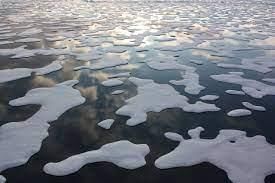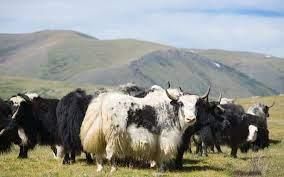UPSC Daily Current Affairs- 16th December 2023 | Current Affairs & Hindu Analysis: Daily, Weekly & Monthly PDF Download
GS-I
How the Hottest Summer ever affected the Arctic?
Subject: Enviro & Biodiversity

Why in News?
The Arctic witnessed its hottest summer ever recorded in 2023, heating up at a rate nearly four times faster than the global average since 1979. The National Oceanic and Atmospheric Administration's Arctic Report Card, a meticulously reviewed assessment conducted by 82 scientists from 13 nations, outlines the significant consequences of this rapid warming.
Key Findings and Consequences of the Arctic Warming
- Thawing Subsea Permafrost
- Accelerated Thawing: Warmer ocean temperatures are speeding up the thawing process of subsea permafrost, which contains organic material.
- Greenhouse Gas Release: This thawing causes organic matter decay, releasing methane and carbon dioxide, intensifying global warming and ocean acidification.
- Research Challenges: Limited studies make it uncertain how much greenhouse gas will be released and its future impact on global warming.
- Food Insecurity
- Salmon Decline: Chinook and chum salmon populations in Western Alaska plummeted to 81% and 92% below the 30-year average, respectively.
- Size Variation: Adult salmon sizes decreased, while sockeye salmon numbers soared 98% above the 30-year average.
- Impact on Communities: Fishery closures due to these changes have deeply affected Indigenous communities, impacting culture and food security.
- Raging Wildfires
- Canada’s Record Wildfires: Over 10 million acres burned in Canada’s Northwest Territories during the worst wildfire season on record.
- Evacuations and Air Quality: Massive evacuations occurred, and the fires’ impact on air quality extended as far as the southern United States.
- Severe Flooding
- Mendenhall Glacier Thinning: Alaska's Mendenhall Glacier has significantly thinned, leading to regular annual floods.
- Catastrophic Flooding: In August 2023, a glacial lake broke through its ice barrier, causing unprecedented flooding and severe damage in Juneau.
- Greenland Ice Sheet Melting
- Rare Melting Events: The highest point on Greenland’s ice sheet melted for only the fifth time in 34 years.
- Continued Mass Loss: Despite increased winter snow, the ice sheet lost around 350 trillion pounds between August 2022 and September 2023.
- Sea-Level Rise: Greenland’s melting ice sheet is the second-largest contributor to the rising global sea levels.
Conclusion
- Immediate and Long-Term Impacts
- Immediate Local Effects: The unprecedented Arctic temperatures have immediate effects on nearby communities.
- Long-Term Global Ramifications: These temperatures also hold long-term implications for worldwide climate patterns.
- Necessity for Additional Research
- Crucial Research Requirement: There's a pressing need for more extensive research to comprehend the complete extent of Arctic warming.
- Mitigation Strategy Development: This research will aid in devising effective strategies to mitigate the impacts.
- Global Accountability
- Urgent Global Action: The discoveries stress the pressing necessity for united global endeavors in tackling climate change.
- Addressing Far-Reaching Effects: It emphasizes the need for collective action to handle the extensive consequences of climate change.
Source: The Indian Express
First yak domesticated 2,500 years ago near the Brahmaputra in Tibet
Subject: Art and Culture

Why in News?
The earliest evidence of humans domesticating yaks was discovered in Bangga, a settlement located in the Shannan prefecture within the Tibetan Autonomous Region of China. Shannan, situated adjacent to Bhutan and Arunachal Pradesh, is crossed by the Brahmaputra River, locally known as Yarlung-Tsangpo.
Yak Domestication: Key Findings
- Around 2,500 Years Back: The people of Bangga didn't just domesticate yaks; they also domesticated taurine cattle, a type commonly found in Europe and temperate Asia.
- Hybrid Creation: The research showed that inhabitants of Bangga bred hybrids by mating yaks with taurine cattle.
- Genus Classification: Yaks, domestic cattle, and aurochs (ancestral cattle) all fall within the same genus, known as Bos.
Bangga: A Fossil-Rich Settlement
- Elevation and Significance: Situated at about 3,750 meters above sea level, Bangga is one of the earliest known agro-pastoral settlements in southern Tibet.
- Systematic Excavation: It is the only site in the region with a wealth of animal remains that has been systematically excavated in recent decades.
Research Methodology and Findings
- Participating Team: The research engaged archaeologists from Washington University in St. Louis, US, along with other collaborators.
- Analysis of Bone Fragments: More than 10,000 pieces of mammal bones underwent examination, with 193 pieces identified as part of the Bos genus.
- Genomic Analysis: Five excellently preserved Bos bones underwent complete genomic sequencing, uncovering one yak and four female taurine cattle specimens.
Surprising Presence of Taurine Cattle
- Unforeseen Existence: The discovery of taurine cattle in an area primarily inhabited by Zebu cattle, around the Indian subcontinent, was unexpected.
- Likely Route of Migration: It's believed that the taurine cattle journeyed to central and eastern Tibet from Anatolia, present-day Turkey, possibly using the Silk Route and northern Tibet as their pathways.
Current Status of Yaks and Their Importance
- Domestic Yaks: Approximately 14 to 15 million domestic yaks inhabit the highlands of Asia, including regions like Ladakh, Himachal Pradesh, Uttarakhand, Sikkim, and Arunachal Pradesh in the Indian Himalayas.
- Wild Yaks: Untamed yaks, never brought into domestication, are categorized as "vulnerable" by the International Union for Conservation of Nature. Only 7,500 to 10,000 mature individuals of this species remain.
- Hybrid Utilization: Communities in the Himalayas and Tibetan Plateau make use of Dzo (male hybrids) and Dzomo (female hybrids) bred from crosses between cattle and yaks.
Source: Down To Earth
GS-II
International Institute for the Unification of Private Law
Subject: International
Why in News?
In a recent election held in Rome, Uma Sekhar from India secured a position on the governing council of the International Institute for the Unification of Private Law (UNIDROIT) during the initial round of voting.
About the International Institute for the Unification of Private Law
- Independence and Origins: Established in 1926 as a League of Nations auxiliary body, the International Institute for the Unification of Private Law (UNIDROIT) later reconstituted in 1940 under the UNIDROIT Statute after the League's dissolution.
- Membership: Comprising 65 Member States across diverse continents, UNIDROIT represents various legal, economic, and political systems, as well as diverse cultural backgrounds.
- Funding: The Institute sustains itself through annual contributions from Member States, determined by the General Assembly.
- Organizational Structure
- UNIDROIT operates with a three-tiered structure consisting of a Secretariat, a Governing Council, and a General Assembly.
- The Secretariat executes daily operations and the Work Programme, led by a Secretary-General appointed by the Governing Council upon the President's recommendation.
- The Governing Council oversees policy aspects, while the General Assembly serves as the highest decision-making body.
- Languages: The official languages encompass English, French, German, Italian, and Spanish, with English and French serving as working languages.
- India's Membership: India has been an active member of UNIDROIT since 1950.
Source: Indian candidate elected to governing council of UNIDROIT
About Mumps: A Contagious Paramyxovirus Infection
Subject: Health
Why in News?
There's growing worry among parents as the occurrences of mumps among children have increased recently in Maharashtra and Telangana states.
About Mumps: A Contagious Paramyxovirus Infection
- Causative Agent: Mumps is caused by a contagious paramyxovirus.
- Symptoms - Gland Swelling: It leads to swelling in the parotid glands situated on both sides of the face, causing pain or tenderness.
- Affected Age Group: The disease primarily affects children and young adults as an acute infection.
- Transmission - Virus Host and Spread:
- Humans are the sole known host for the mumps virus.
- The virus spreads through direct contact or airborne droplets from the upper respiratory tract of infected individuals.
- Symptoms and Progression - Incubation Period:
- After an incubation period of 2 to 4 weeks, mumps starts with non-specific symptoms like myalgia, headache, malaise, and mild fever.
- Swelling in the parotid salivary glands typically occurs within days, affecting other salivary glands in 10% of cases.
- Nature of Disease: Mumps is generally a mild, self-limiting illness that usually resolves without complications.
- Possible Complications:
- Complications might involve encephalitis or sensorineural deafness.
- Orchitis, a painful inflammation of the testes, occurs in around 20% of young adult males with mumps.
- Treatment and Prevention:
- No specific treatment exists for mumps, but symptomatic relief can be provided through various medications.
- Immunization against mumps, especially in children, is the most effective preventive measure.
Source: Hindustan Times
Maldives decides to end Hydrographic Survey Pact with India
Subject: International Relations
Why in News?
The Maldives government decided against extending a hydrographic survey deal with India, signifying a notable shift in their bilateral relations.
Hydrographic Survey Pact: A Backgrounder
- Nature of Hydrographic Surveys: Hydrographic surveys aim to map water bodies, aiding safe and efficient maritime transportation.
- 2019 Agreement: In June 2019, during Prime Minister Modi's visit to the Maldives, a Memorandum of Understanding (MoU) was established for collaboration in hydrography between the Indian Navy and the Maldives National Defence Force (MNDF).
Activities under the Pact
- Joint Hydrographic Surveys: Three joint surveys were conducted in 2021, 2022, and 2023, involving Indian Naval Ships like INS Darshak and INS Sutlej.
- Survey Objectives: The surveys aimed to update navigational charts and support sectors like tourism and fisheries. They also involved tidal observations and identifying new shoals.
- Support to MNDF: India provided hydrographic equipment and training to MNDF personnel, aligning with its policy of supporting the Maldives in establishing hydrographic capabilities.
India’s Hydrographic Survey Agreements with Other Countries
- Global Hydrographic Efforts: India has conducted hydrographic surveys in various countries, including Sri Lanka, Myanmar, and Bangladesh.
- International Cooperation: The National Hydrographic Office highlights the potential for international cooperation in hydrography, especially in regions with limited capabilities.
Reasons behind Maldives’ Decision
- Regime Change: The election of Mohamed Muizzu of the Progressive Party of Maldives (PPM), seen as more pro-China, contrasts with his predecessor President Solih’s India-friendly stance.
- Geopolitical Dynamics: China’s increasing influence in the Indian Ocean region, particularly through the Belt and Road Initiative (BRI), has impacted India’s traditional sphere of influence in the Maldives.
- ‘India Out’ Campaign: Allegations of Indian military presence and the new administration’s emphasis on national security and self-reliance in hydrographic capabilities have influenced this decision.
Possible outcomes
- Changing Geopolitical Landscape: The Maldives’ decision reflects the shifting geopolitical dynamics in the Indian Ocean, with growing Chinese influence challenging India’s traditional role.
- Impact on India-Maldives Relations: This development could signify a recalibration of the Maldives’ foreign policy, potentially impacting India’s strategic interests in the region.
Source: The Indian Express
GS-III
Social Stock Exchange
Subject: Indian Economy

Why in News?
The Unnati Foundation achieved the distinction of being the inaugural entity to be listed on the social stock exchanges (SSE).
What is a Social Stock Exchange?
- The SSE, operating as an independent division within the current stock exchange, enables social enterprises to raise funds from the public using its framework.
- It acts as a platform for enterprises to secure funding for their social projects, enhance their visibility, and offer greater transparency regarding fundraising and fund utilization.
- On the Main Board, retail investors are restricted to investing solely in securities offered by for-profit social enterprises (SEs).
- For other instances, securities issued by SEs can only be invested in by institutional investors and non-institutional investors.
Eligibility
- Any non-profit organization (NPO) or for-profit social enterprise (FPSE) that prioritizes social goals will be acknowledged as a social enterprise (SE) and thus qualifies for registration or listing on the SSE.
- Regulations 292E within SEBI’s ICDR (Issue of Capital and Disclosure Requirements) Regulations, 2018 present seventeen potential criteria. These criteria involve the requirement for enterprises to focus on eliminating hunger, poverty, malnutrition, and inequality; advocating education, employability, equality, empowerment of women and LGBTQIA+ communities; striving for environmental sustainability; safeguarding national heritage and art; or working to bridge the digital gap, among other objectives.
- A minimum of 67% of their endeavors should be aimed at achieving the declared objective. Entities such as corporate foundations, political or religious organizations or activities, professional or trade associations, infrastructure and housing companies (except those involved in affordable housing) won’t be recognized as an SE.
Source: Indian Express
MH-60 Romeo Helicopter
Subject: Defence & Security
Why in News?
Lockheed Martin delivered the sixth MH-60R "Romeo" helicopter to the Indian Navy recently.
About MH-60 Romeo Helicopter
- Regarded as the world's most advanced maritime helicopter, the MH-60R "Romeo" is the primary anti-submarine and surface warfare helicopter for the U.S. Navy. It's adept for both land and maritime operations.
- Crafted by U.S. defense giant Lockheed Martin, it stands as an all-weather helicopter featuring cutting-edge avionics and sensors.
- This helicopter is engineered to perform diverse missions encompassing anti-submarine warfare (ASW), anti-surface warfare (ASuW), search-and-rescue (SAR), naval gunfire support (NGFS), surveillance, communications relay, logistics support, personnel transfer, and vertical replenishment.
- In 2020, the Indian government placed an order for 24 MH-60 Romeo helicopters for the Indian Navy, amounting to over 14,000 crores. The deliveries began in 2022 and are slated for completion by 2025.
Source: HT
|
38 videos|5269 docs|1114 tests
|
FAQs on UPSC Daily Current Affairs- 16th December 2023 - Current Affairs & Hindu Analysis: Daily, Weekly & Monthly
| 1. How did the hottest summer ever affect the Arctic? |  |
| 2. What are the consequences of the Arctic ice melt caused by the hottest summer ever? |  |
| 3. How does the hottest summer ever impact Arctic wildlife? |  |
| 4. What are the implications of the Arctic ice melt for global sea levels? |  |
| 5. What are the potential long-term consequences of the hottest summer ever on the Arctic? |  |
















